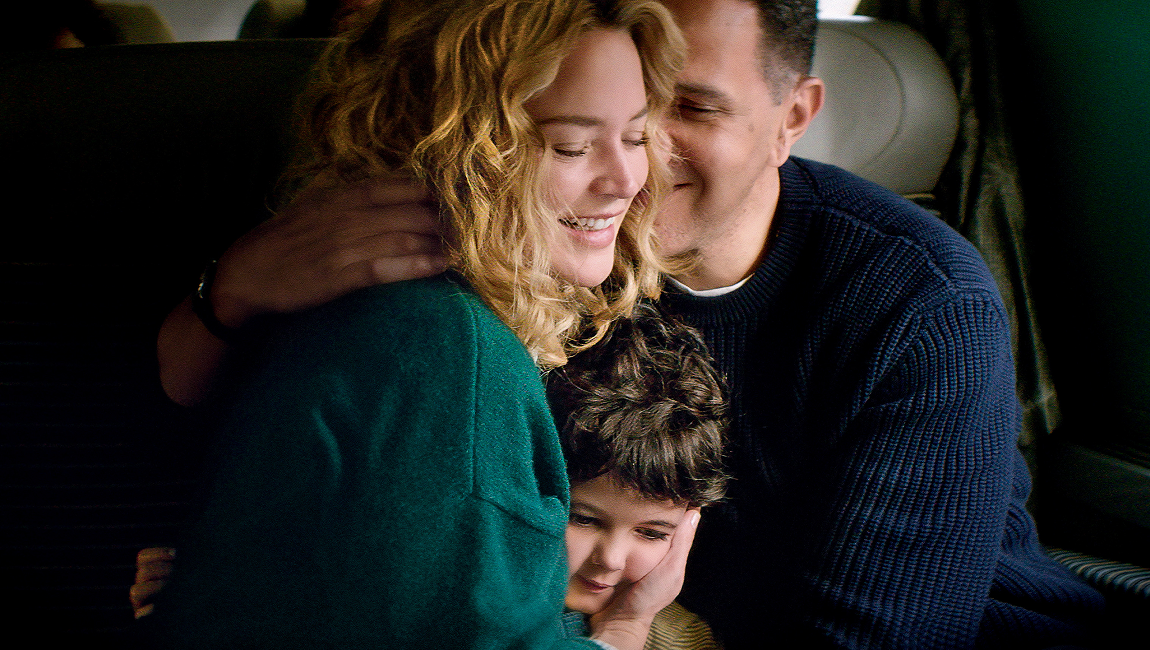The stepmother is typically an outsider role in literature. Not so in Rebecca Zlotowski’s Other People’s Children. Adapted from Romain Gary’s novel, Your Ticket Is No Longer Valid — which centers on a man’s infertility — Zlotowski’s latest tells a story that’s evolved to be a character study of a woman’s exclusion from traditional milestones of her own life because she hasn’t chosen to have biological children yet. Rachel (Virginie Efira) is constantly told that she’s running out of time. Her gynecologist (an infamous, in niche circles, cameo from Frederick Wiseman) tells her that her “biological clock’s ticking,” her sister (Yamée Couture) becomes pregnant, and her new partner, Ali (Roschdy Zem), is hesitant to fully give her access into his personal life, initially due to fears about his four-year-old daughter, Leila (Callie Ferreira Goncalves). Though the development of Rachel loving Leila as her own is the primary source of her internal doubts about a child-free life, the title here doesn’t just refer to Leila. Rachel teaches middle school, and takes on a mentoring role with a struggling student (Victor Lefebvre), at times supporting him in the ways one might a son.
Other People’s Children is told entirely without the expected, more dramatic (louder) moments. Music cues rise or cut in earlier than expected, a whole scene can fade to black, or a conversation won’t be audible until it’s in the aftermath of conflict. This strategy gives the characters privacy, and lends more weight to the subtleties of performing reflection rather than action. In particular, the use of Vivaldi’s “Mandolin Concerto in C Major” becomes a Kramer vs. Kramer nod, intentionally signaling memories of more conflict-driven relationships. Further, by choosing to frame this narrative — in which multiple relationships, large and small, enter and change and leave Rachel’s life — through its emotional aftermath, Zlotowski bends what would otherwise be a simple falling-in-love-then-out-of-love story into a character study of a woman whose every desire is complicated by life itself. In other words, this is a narrative that should be a melodrama, in the expected sense: music should rise and fall with the tension; the characters should fight on camera, and Rachel should cry when it’s all over. And yet, this isn’t that; with the leisure of a Sautet or Rohmer drama, the best character moments come packaged in peaceful performance, rather than affective outbursts.
Not only is Rachel centered in a narrative that would traditionally place her in a supporting role, but none of her choices or concerns exist within a vacuum. Rachel discusses her past experiences of abortion with a partner, and how, though she wants children now, that wasn’t always a goal. She explains how her own relationship with motherhood is marred by her mother’s death. This also comes up when Rachel, her sister, and her father (Michel Zlotowski, no stranger to making appearances in his daughter’s films) visit her mother’s grave, debating the role of Rachel’s unborn niece in Jewish law, and more broadly, what constitutes “life.” These conversations — questioning and affirming and remembering the idea of choice — don’t pretend that decisions made were easy or right, only that their outcome has become a fact of life. Rachel hasn’t made up her mind about what she wants from Ali, how she feels about Leila’s mother (Chiara Mastroianni), or whether she needs biological children to feel complete; she’s able to grow and change and live without settling into her 40s according to someone else’s prescription.
Efira builds out her performance in moments where things are left unsaid. It’s in the wistful selflessness that comes through as she slips her hand into her back pocket when Leila’s mother shows up at her judo class; in the regret-tinged rejection of a kiss. Rather than playing Rachel’s worry as histrionic neurosis, she dons a smiling mask of grace as she slowly opens herself to the possibilities of her world. Though Sibyl and Benedetta displayed a dramatic prowess, this warm, layered turn from Efira may instead remind accustomed viewers of her work in Madeleine Collins, as a mother living a double life trying to keep up appearances. Her happy ending isn’t marriage, having a child, or an impulsive chase of an impossible dream — it’s putting herself first and not accepting what comes without condition, further emphasized by an epilogue that offers a reprioritization of the character, and an honest one at that.
Published as part of InRO Weekly — Volume 1, Issue 4.







